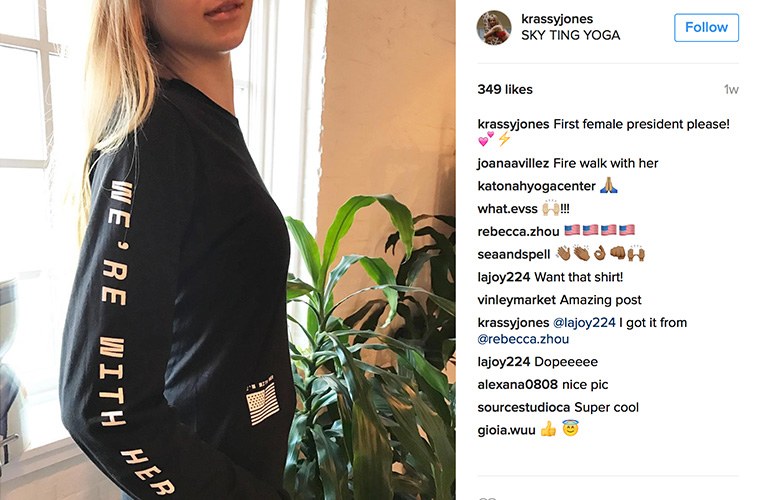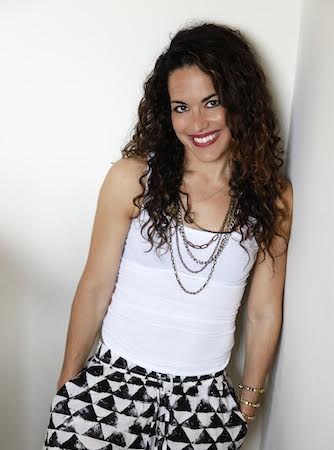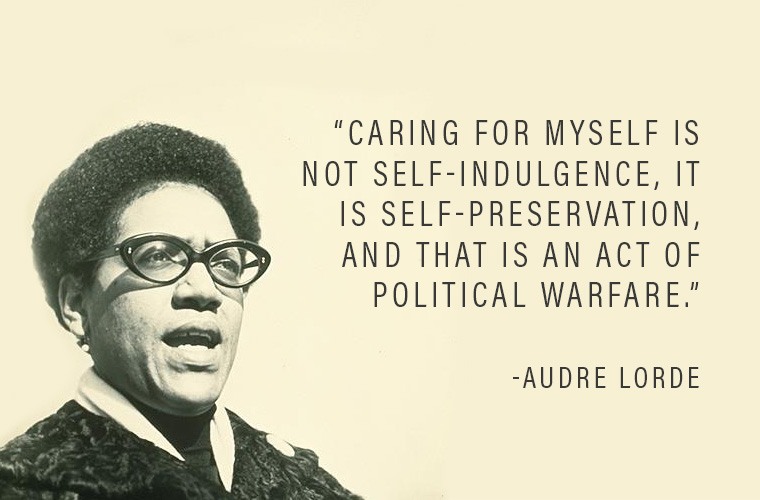Why Wellness Has Always Played an Important Role in Politics and Activism
The night after the election, the usual lineup of CNN suits was taking stock of the election in the usual ways: unpacking voter turnout, imagining policy directions, and tracking the anti-Trump protests growing in the streets. Then something unusual happened: presidential historian Douglas Brinkley commented that voters are processing Trump’s stunning victory “by meditating, going to the gym….”
This offhand shout-out to self care was rare in a panel of male, prime time pundits, but spot-on: Wellness has played an important role in this bitter election, both as an expression of politics and as a refuge from it.
Wellness has played an important role in this bitter election, both as an expression of politics and as a refuge from it.
Don’t get it twisted—wellness wasn’t central to either the platform or the personal life of the President-elect. While Hillary does yoga and meditation, Trump counts golf and public speaking (namely with lots of hand gestures) as his version of exercise. In other words, our days of a White House organic garden and stealth vids of presidential workouts are likely numbered.
But on the ground in the weeks leading up to the election, the largely female wellness world increasingly and unapologetically talked politics.

Appeals to get “with her” were all over #fitspo heavy Insta-land, a realm where you’re more likely to find cross-training selfies than campaigning. DanceBody posted an “I Voted” pin with the unambiguous hashtag #imwithher; Wednesday morning they promised to “Make America Dance Again” and posted a Hillary #wcw. These moves could have consequences; commenters advised unapologetic Hillary supporters from Tracy Anderson to the fitness blogger behind The Sweat Life to “stick to fitness” (and usually in less printable language).

{{post.sponsorText}}
This pub right here is no exception; comments on one Facebook post for the Million Woman March protest on Washington, DC, split readers between those who celebrated getting political with our bodies and those who denounced protesting and abortion as anything but "well and good."
So why were wellness brands potentially going “off brand” by getting political for Hillary?
Women’s fitness is not about shaping ourselves into an image pleasing to men, but about strengthening our bodies, and our bonds to each other.
While a certain amount of “girl power” lingo has become standard in workout settings, supporting a candidate was a rhetorical step up, but one that makes sense.
Trump’s attacks on women’s bodies were a nasty fixture of his campaign: boasting of sexual assault, body-shaming in every way possible in what is becoming an era of growing body-positivity. (Forcing beauty queen Alicia Machado to work out in front of a camera crew as punishment for being “a girl who likes to eat,” for example.)
The fact that movers-and-shakers in the wellness world (like Sky Ting Yoga's Krissy Jones, pictured above) chose to promote his female opponent cemented a core commitment of today’s wellness world: Women’s fitness is not about shaping ourselves into an image pleasing to men, but about strengthening our bodies, and our bonds to each other.

In the days since the election, politics are still front and center among the #fitfam, and the tone ranges from encouraging escape to fostering engagement in the political system.
Yoga heavy-hitters were first out of the gate on Wednesday morning: Lara Benusis offered free passes to her usually members-only Equinox yoga classes in New York City; yoga educator Leslie Kaminoff of the Breathing Project offered the much-retweeted reminder that “stress-reduction is now the world’s #1 growth industry. Let’s do what we do best: stay centered and offer safe havens.”
Across the interwebs, from #fitpros offering their services—often freely—to casual exercisers posting that a long run or meditation session is all that got them through the day, wellness looked far more like a lifeline than a luxury.
Other wellness pros are tackling the election and its aftershocks head-on. Celebrity trainer Lacey Stone taught an early-morning Flywheel class in Los Angeles the day after the election, and showed up with “an empowering playlist full of songs like ‘Who Run the World?’” that assumed a Clinton win. Usually packed, the class had only 10 students, whom Stone found shaken “and extremely depressed.”
Khouri emphasized that staying “woke” is crucial to allying with those who don’t have the luxury of escaping into child’s pose.
Acknowledging that for her too, Clinton’s loss was almost as devastating as a death, Stone kept the playlist and focused on an election-inspired lesson: “We were in a place of losing hope. But what happens when you lose? You have to keep fighting and going for it, and not let your mission ever stop. People have really rallied around that,” she says.
Yoga educator and activist Hala Khouri advised her Facebook following to resist the urge to tell students, “Don’t give in to the fear,” or, “Stay away from negative thoughts and feelings.” On the contrary, encouraged that “many people have woken up as a result of this election," Khouri emphasized that staying “woke” is crucial to allying with those who don’t have the luxury of escaping into child’s pose: “If you imply that it is not yogic to be scared or feel negative, you discount their reality and marginalize them even further.”
And star yogi and "movement alchemist" Shiva Rea posted a video of an L.A. anti-Trump protest to her 50K following with the caption “Proud to be from California.”
Civic participation and self-care today have become closely intertwined, whereas for almost the last half-century, they've been seen as in opposition to each other.
Here’s a quick timeline of what I mean:
In the 1970s, when yoga and meditation became widely popular, social critics understood this interest as a turning away from the serious political engagement of the 1960s and toward a troubling “culture of narcissism.” (Hence the navel-gazing stereotype.)
In the 1980s, the aerobics boom was largely understood not just to suggest political disengagement, but to work against feminism—one scholar described the ubiquitous workout videos as promoting a “passive femininity.”
By the early 2000s, when 9/11 drove the economy into a slump (especially in New York City), the fledgling wellness industry surprisingly grew. Entrepreneur and Exhale founder Annbeth Eschbach recalls doubting investors would be interested in her idea for a New York City-based mind-body business, but 28 locations later, Exhale is still booming. Yet as the wellness space expanded in these years—Equinox! YogaWorks! Lululemon!—it was often mocked as a playground for bored, affluent women unmoved to invest their energies in anything more socially productive than their own self-actualization (and the sculpted abs that accompany it).
Group fitness helped women “refuse to be afraid we will no longer be considered attractive and acceptable when we are strong.”
These criticisms of wellness culture were often simplistic and misogynistic.
In the 1970s, wellness was often overtly political, as the Black Panthers started health clinics to serve communities “body and soul.” Feminists opened wellness centers to combat the prevalent feeling among women that the male medical establishment believed “being a woman is a disease,” as one activist put it.
The book that started the aerobics revolution, Jane Fonda’s Workout Book, included not just the famous leg-lifts and leotards, but also usually forgotten pages of political commentary on how group fitness helped women “refuse to be afraid we will no longer be considered attractive and acceptable when we are strong.” Her first studio might have catered to the Beverly Hills set, but its profits funded the Campaign for Economic Democracy, and Jane herself had for decades previously used her own political conscience to protest the Vietnam War.
As these activists knew, and poet Audre Lorde later put it, “Caring for myself is not self-indulgence, it is self-preservation, and that is an act of political warfare.”
Rather than just another form of navel-gazing for the wealthy, wellness practices are now spreading as advocates realize that cultivating mind-body wellbeing is a human right.
As wellness has become a major force in mainstream American life in the last decade (this publication evidence of it!), anti-wellness backlash has inspired its own counter-backlash: In spite of herself, lefty critic Laurie Penny came to love yoga as crucial to sustaining her activism, even as she reflected that “the light in me is sometimes a government building on fire.”
Rather than just another form of navel-gazing for the wealthy, wellness practices are now spreading into schoolhouses, prisons, and even the factory floor as advocates realize that cultivating mind-body wellbeing is a human right. (Though not everyone agrees!)
The upshot? Many of us have an expanding range of wellness options to help us sort through election aftershocks, which means we also have no excuse not to use our strength and energy to push our President-elect to expand those opportunities—and a bold, pro-woman policy agenda—to the many Americans who do not.

Meet Well+Good’s fitness historian, Natalia Petrzela, Phd, a history professor at The New School in New York City and a premier IntenSati instructor, who shares how the sweaty past informs the present in this column.
Learn your fitness history: Before kale salads were a thing, wellness was considered weird—watch Dan Rather try to explain what it is. And check out the (misunderstood) body-positive ethos of women who do CrossFit, and the long-standing connection of yoga and sex.
Loading More Posts...
